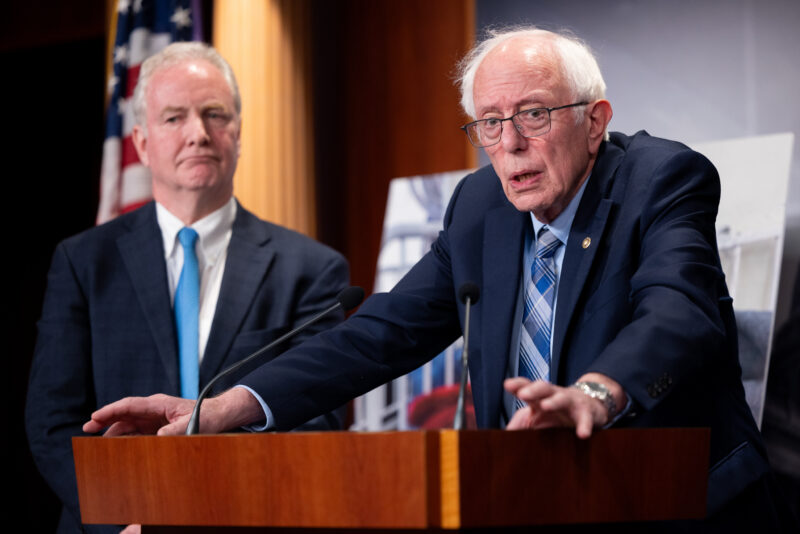Senate Democrats discuss Israel aid conditions with White House national security advisor
‘There are different views on that and we’re going to have to have a discussion with the caucus and the administration,’ Senate Majority Leader Chuck Schumer said
Kevin Dietsch/Getty Images
Chairman of the Senate Health, Education, Labor and Pensions Committee Sen. Bernie Sanders (I-VT) questions Monica Bertagnolli during her confirmation hearing on October 18, 2023 in Washington, D.C.
National Security Advisor Jake Sullivan met with Senate Democrats on Tuesday to discuss potential efforts, championed by progressives, to place conditions on U.S. emergency aid to Israel. Lawmakers indicated that the conversations had not reached a conclusion and would likely continue.
“Different people voiced different views on it,” Sen. Bernie Sanders (I-VT), one of the leading champions of conditions, said. “I think what I’m happy about is we’re beginning to have some serious discussions, and obviously there are differences of opinion.”
Sanders suggested he might try to force a vote on conditions.
Senate Majority Leader Chuck Schumer (D-NY) said in a press conference that the meeting on Tuesday was the latest in a series of discussions around conditioning aid to Israel.
“There are different views on that and we’re going to have to have a discussion with the caucus and the administration,” Schumer said. “But above all, we’ve got to pass the [emergency aid bill]. That’s the North Star.”
Schumer didn’t specifically answer a question about his personal views on the subject, saying, “I’m going to discuss it with the administration and my caucus” — not overtly ruling out supporting conditions. He said he’ll bring the emergency aid bill, which will also include Ukraine, Taiwan and humanitarian funding, up for a vote next week.
The current group of lawmakers publicly and explicitly supporting conditions remains small, including Sanders, Welch and Sen. Chris Murphy (D-CT), although a few others have indicated openness to the idea. Other Senate Democrats have explicitly ruled out supporting conditions.
Sen. Peter Welch (D-VT), after the caucus meeting, issued a statement that he would “push for policies that ensure taxpayer dollars are only used in ways that comply with international humanitarian law.” He also called for a permanent cease-fire between Israel and Hamas, arguing that the U.S. “cannot condone a resumption of the bombing when it causes death and injury to so many civilians.” Unlike some colleagues, Welch did not specifically call for Hamas to be demilitarized and removed from governance in Gaza as part of a cease-fire, but said hostage release talks must continue.
Sen. Richard Blumenthal (D-CT), who attended a meeting with senior Israeli Defense Forces officials yesterday, said he expects that there will be a “continuing effort” by the Israeli military to “minimize civilian deaths even more effectively than has been done so far.” He argued that pressure from President Joe Biden and lawmakers has been effective in helping to reduce civilian casualties. He also suggested the current pause could be extended by days or weeks.
“One of the reasons why I have opposed detailed restrictions is I don’t think we should be putting into statute, in effect micromanaging, the use of arms by Israel when it’s fighting for its own existence against a terrorist organization committed to destroy and annihilate the Israeli people,” Blumenthal said.
He also noted that U.S. laws requiring that foreign military assistance be used in accordance with human rights laws already apply to Israel.
Sen. John Fetterman (D-PA) said he wants “zero conditions,” adding, “I stand with Israel, and they shouldn’t have any conditions.”
The prospect of conditions also met with a chilly reception from Senate Minority Leader Mitch McConnell (R-KY), who called it “ridiculous” and “totally unnecessary” during a press conference — indicating that any bill including conditions would face serious hurdles among Senate Republicans.
Even if conditions on aid to Israel aren’t included in the emergency funding bill — a likely outcome given that Democrats will need support from Republicans and their most pro-Israel members to move the bill forward — the current conflict does appear to have pushed forward discussion on the topic, which pro-Israel activists and lawmakers have long worked to keep confined to the far fringes.
“Placing additional conditions on assistance is not in the security interest of the U.S. or Israel. The reality is that Israel is taking extraordinary steps to avoid civilian casualties even at the risk of the safety of its own soldiers,” AIPAC spokesperson Marshall Wittmann told JI. “The actual perpetrator of civilian casualties is Hamas, which uses innocents as human shields. The way to prevent future threats to civilians is to remove Hamas from Gaza. That is why Congress should quickly pass President Biden’s security assistance proposal for Israel — without additional conditions.”
Schumer also announced at his press conference that he’ll be delivering a “major” Senate floor address on Wednesday on “the dangerously dark and terrifying trend of antisemitism that is on the rise” since Oct. 7.
“The solidarity that Jewish Americans, myself included, initially received from our fellow citizens in the aftermath of Oct. 7 has been drowned out by some others, even some we considered allies,” Schumer said. “It’s an all too painful reminder that antisemitism has long seeped below the surface and now has reared its ugly head in painful, blatant, dangerous ways.”
He indicated the speech would address antisemitism on campuses among other issues.











































